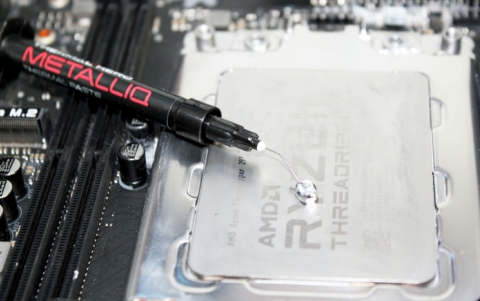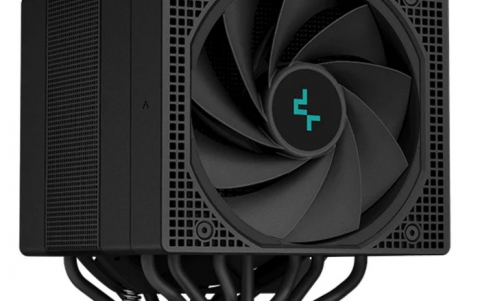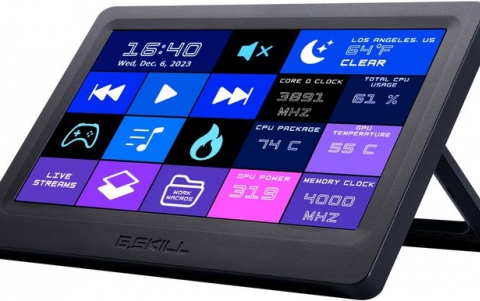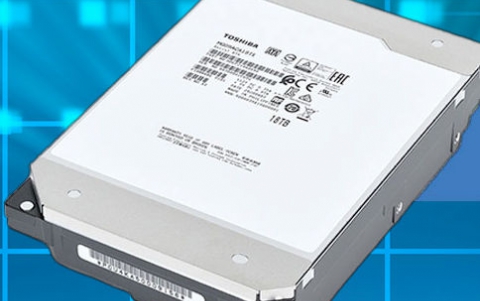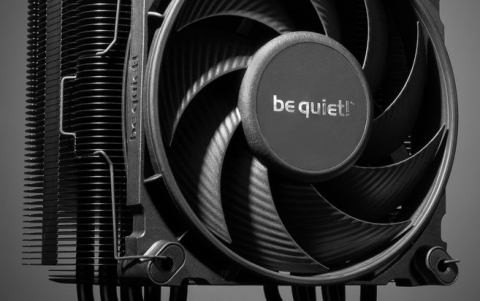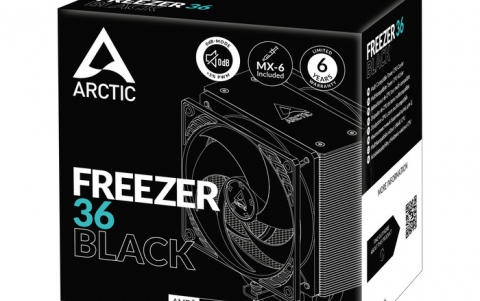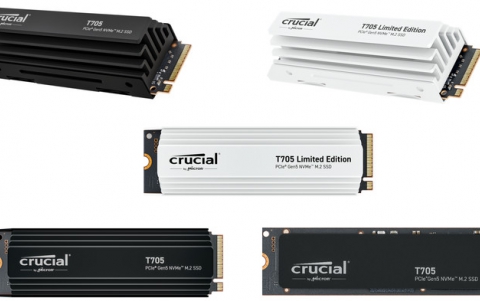
Nokia and Microsoft Partner On Mobiles
Nokia and Microsoft have teamed up to take on Google and Apple in the smartphone market as the Finnish cellphone maker attempts to regain its leading position in the sector.
Nokia and Microsoft intend to jointly create market-leading mobile products and services. As each company would focus on its core competencies, the partnership would create the opportunity for rapid time to market execution. Additionally, Nokia and Microsoft plan to work together to integrate key assets and create completely new service offerings, while extending established products and services to new markets.
Under the proposed partnership:
- Nokia would adopt Windows Phone as its principal smartphone strategy, innovating on top of the platform in areas such as imaging, where Nokia is a market leader.
- Nokia would help drive the future of Windows Phone. Nokia would contribute its expertise on hardware design, language support, and help bring Windows Phone to a larger range of price points, market segments and geographies.
- Nokia and Microsoft would closely collaborate on joint marketing initiatives and a shared development roadmap.
- Bing would power Nokia's search services across Nokia devices and services. Microsoft adCenter would provide search advertising services on Nokia's line of devices and services.
- Nokia Maps would be a core part of Microsoft's mapping services. For example, Maps would be integrated with Microsoft?s Bing search engine and adCenter advertising platform
- Nokia's operator billing agreements would make it easier for consumers to purchase Nokia Windows Phone services in countries where credit-card use is low.
- Microsoft development tools would be used to create applications to run on Nokia Windows Phones.
- Nokia's content and application store would be integrated with Microsoft Marketplace .
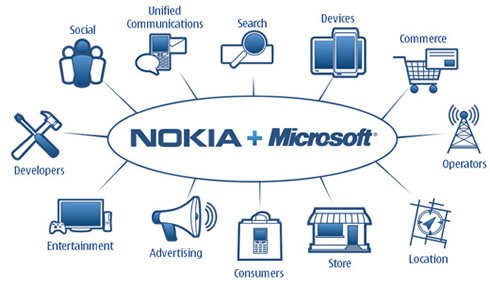
"Today, developers, operators and consumers want compelling mobile products, which include not only the device, but the software, services, applications and customer support that make a great experience," Stephen Elop, Nokia President and CEO, said at a joint news conference in London. "Nokia and Microsoft will combine our strengths to deliver an ecosystem with unrivalled global reach and scale. It's now a three-horse race."
"I am excited about this partnership with Nokia," said Steven A. Ballmer, Microsoft CEO. "Ecosystems thrive when fueled by speed, innovation and scale.The partnership announced today provides incredible scale, vast expertise in hardware and software innovation and a proven ability to execute."
Nokia has rapidly lost share in the smartphone market to the likes of Apple's iPhone, and products based on Google's Android platform.
"Nokia is at a critical juncture, where significant change is necessary and inevitable in our journey forward," said Stephen Elop, Nokia President and CEO. "Today, we are accelerating that change through a new path, aimed at regaining our smartphone leadership, reinforcing our mobile device platform and realizing our investments in the future."
Nokia said 2011 and 2012 would be transition years for the company as it built up the partnership with Microsoft.
With Nokia's planned move to Windows Phone as its primary smartphone platform, Symbian becomes a franchise platform, leveraging previous investments to harvest additional value. This strategy recognizes the opportunity to retain and transition the installed base of 200 million Symbian owners. Nokia expects to sell approximately 150 million more Symbian devices in the years to come.
Under the new strategy, MeeGo becomes an open-source, mobile operating system project. MeeGo will place increased emphasis on longer-term market exploration of next-generation devices, platforms and user experiences. Nokia said that it still plans to ship a MeeGo-related product later this year.
New company structure
As of April 1, Nokia will have a new company structure, which features two distinct business units: Smart Devices and Mobile Phones. They will focus on Nokia's key business areas: high-end smartphones and mass-market mobile phones.
The following sub-units now in Mobile Solutions will move under Smart Devices:
- Symbian Smartphones
- MeeGo Computers
- Strategic Business Operations
To support the planned new partnership with Microsoft, Smart Devices will be responsible for creating a winning Windows Phone portfolio.
Mobile Phones will drive Nokia's "web for the next billion" strategy. Mobile Phones will leverage Nokia's strength in growth markets to connect the next billion people and bring them affordable access to the Internet and applications.
Markets will be responsible for selling products, executing compelling marketing and communications, creating a competitive local ecosystem, sourcing, customer care, manufacturing, IT and logistics across all Nokia products.
Services and Developer Experience will be responsible for Nokia's global services portfolio, developer offering, developer relations and integration of partner service offerings.
NAVTEQ, an integral part of Nokia's location and advertising business, will be headed by Larry Kaplan, and continue as a separate reporting entity.
Nokia Siemens Networks continues in the Nokia Group as a separate reporting entity.
Under the proposed partnership:
- Nokia would adopt Windows Phone as its principal smartphone strategy, innovating on top of the platform in areas such as imaging, where Nokia is a market leader.
- Nokia would help drive the future of Windows Phone. Nokia would contribute its expertise on hardware design, language support, and help bring Windows Phone to a larger range of price points, market segments and geographies.
- Nokia and Microsoft would closely collaborate on joint marketing initiatives and a shared development roadmap.
- Bing would power Nokia's search services across Nokia devices and services. Microsoft adCenter would provide search advertising services on Nokia's line of devices and services.
- Nokia Maps would be a core part of Microsoft's mapping services. For example, Maps would be integrated with Microsoft?s Bing search engine and adCenter advertising platform
- Nokia's operator billing agreements would make it easier for consumers to purchase Nokia Windows Phone services in countries where credit-card use is low.
- Microsoft development tools would be used to create applications to run on Nokia Windows Phones.
- Nokia's content and application store would be integrated with Microsoft Marketplace .

"Today, developers, operators and consumers want compelling mobile products, which include not only the device, but the software, services, applications and customer support that make a great experience," Stephen Elop, Nokia President and CEO, said at a joint news conference in London. "Nokia and Microsoft will combine our strengths to deliver an ecosystem with unrivalled global reach and scale. It's now a three-horse race."
"I am excited about this partnership with Nokia," said Steven A. Ballmer, Microsoft CEO. "Ecosystems thrive when fueled by speed, innovation and scale.The partnership announced today provides incredible scale, vast expertise in hardware and software innovation and a proven ability to execute."
Nokia has rapidly lost share in the smartphone market to the likes of Apple's iPhone, and products based on Google's Android platform.
"Nokia is at a critical juncture, where significant change is necessary and inevitable in our journey forward," said Stephen Elop, Nokia President and CEO. "Today, we are accelerating that change through a new path, aimed at regaining our smartphone leadership, reinforcing our mobile device platform and realizing our investments in the future."
Nokia said 2011 and 2012 would be transition years for the company as it built up the partnership with Microsoft.
With Nokia's planned move to Windows Phone as its primary smartphone platform, Symbian becomes a franchise platform, leveraging previous investments to harvest additional value. This strategy recognizes the opportunity to retain and transition the installed base of 200 million Symbian owners. Nokia expects to sell approximately 150 million more Symbian devices in the years to come.
Under the new strategy, MeeGo becomes an open-source, mobile operating system project. MeeGo will place increased emphasis on longer-term market exploration of next-generation devices, platforms and user experiences. Nokia said that it still plans to ship a MeeGo-related product later this year.
New company structure
As of April 1, Nokia will have a new company structure, which features two distinct business units: Smart Devices and Mobile Phones. They will focus on Nokia's key business areas: high-end smartphones and mass-market mobile phones.
The following sub-units now in Mobile Solutions will move under Smart Devices:
- Symbian Smartphones
- MeeGo Computers
- Strategic Business Operations
To support the planned new partnership with Microsoft, Smart Devices will be responsible for creating a winning Windows Phone portfolio.
Mobile Phones will drive Nokia's "web for the next billion" strategy. Mobile Phones will leverage Nokia's strength in growth markets to connect the next billion people and bring them affordable access to the Internet and applications.
Markets will be responsible for selling products, executing compelling marketing and communications, creating a competitive local ecosystem, sourcing, customer care, manufacturing, IT and logistics across all Nokia products.
Services and Developer Experience will be responsible for Nokia's global services portfolio, developer offering, developer relations and integration of partner service offerings.
NAVTEQ, an integral part of Nokia's location and advertising business, will be headed by Larry Kaplan, and continue as a separate reporting entity.
Nokia Siemens Networks continues in the Nokia Group as a separate reporting entity.















